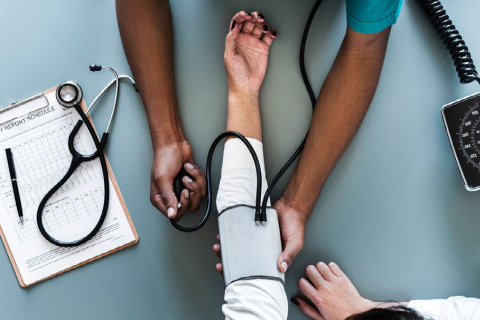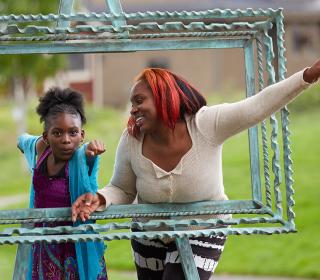While the COVID-19 pandemic has been devastating to all, Black, Indigenous and People of Color (BIPOC) communities have been disproportionately impacted. Both the CDC and Washington state data illustrate disturbing disparities in COVID infection, hospitalization, and death rates for BIPOC adults and children. But too often, when confronted with sobering statistics like this, there is no discussion of why this is our reality.
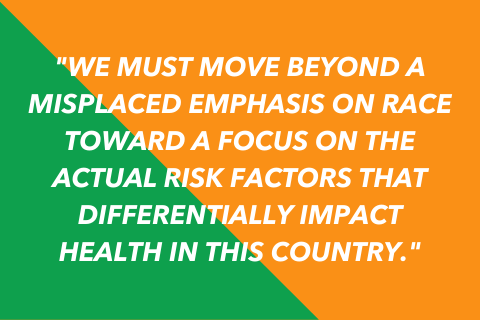
It is impossible to make progress towards real solutions when conversations about the intersection of race and healthcare are misinformed, at best, and fatal at worst. Our collective and persistent avoidance of naming and acknowledging systemic failures limits our ability to holistically address them. We must move beyond a misplaced emphasis on race toward a focus on the actual risk factors that differentially impact health in this country.
As Black health providers, we know that our healthcare system is sick. There are factors that increase risk - but race isn’t one of them. Relevant factors include your job, your pay, access to fresh food, access to quality healthcare, medical providers who believe and listen to you, your housing situation, and your community connections. To be clear, there are few genetic or biological factors implicated in worse health outcomes. The structural racism embedded in our employment, education, health, and housing systems has and continues to make us sick. Legacies of employment and housing discrimination meant that, when COVID hit, many BIPOC didn’t have the luxury of working from home or physically distancing. BIPOC communities are overrepresented in lower-paid employment lacking benefits such as insurance. Gentrification and rising home prices mean many of us have been priced-out of neighborhoods, cut off from vital community services, support, and connection.
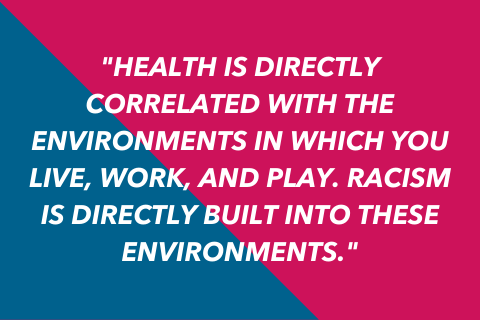
Health is directly correlated with the environments in which you live, work, and play. Racism is directly built into these environments. Yet, race and racism are often conflated. A quick scan of most health-related news illustrates this with misleading headlines like “Black people have higher rates of heart disease/diabetes/etc." This is much more than a semantics problem. When we frame disparate health outcomes in terms of individual responsibility, we absolve our leaders of the duty to dismantle the racism embedded in these structures. Naming the real problems facilitates the deliberate consideration of the myriad factors that impact health, and moves us toward solutions that can create healthier communities.
We’re all better served when we tap into the strengths and solutions of the communities most impacted by inequities. A recent example of this lies in the massive inroads being made around COVID vaccination rates in BIPOC communities across the country. In cities like Seattle, where actions have been taken to ensure equitable vaccine distribution, equity has become a reality because of community-led efforts. These efforts have depended on existing community capacity, trusted voices, community leaders, and the availability of vaccine information to build vaccine confidence. BIPOC communities have well-founded reasons to be skeptical of medical progress in this country, and for all the media to-do around “vaccine hesitancy,” we know that the focus must be on building vaccine confidence through resources and information to ensure communities have what they need to make informed decisions.
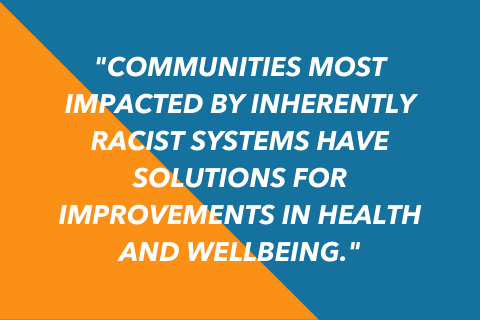
Clearly, our current perceptions and discourse about health are ineffective - so where do we go from here? We all have a role to play in dismantling harmful narratives. Words have power. When we center misleading statistics and sound bites about disparate health outcomes, and fail to mention the inherently racist structures that directly yielded those results, we obfuscate the real problems. This not only hinders our ability to effectively address them, it also prevents recognition of the fact that communities most impacted by inherently racist systems have solutions for improvements in health and wellbeing.
Michele Andrasik is a clinical health psychologist. She is the Director of Social and Behavioral Sciences and Community Engagement for the Fred Hutchinson-based HIV Vaccine Trials Network and the COVID-19 Prevention Network, Senior Staff Scientist in the Fred Hutchinson Vaccine and Infectious Disease Division and an Affiliate Assistant Professor in the Departments of Global Health and Environmental and Occupational Health Sciences at the University of Washington. Her work focuses on addressing health inequities among Black, Indigenous, People of Color, and gender and sexual minority communities.
Joycelyn Thomas holds a Doctor of Nursing Practice degree from the University of Washington. Currently, she works as a Family Nurse Practitioner at a Family Practice Clinic for Virginia Mason Franciscan Health where she is also the Medical Director. Dr. Thomas is also currently working with a collaborative between Fred Hutchinson, African American Reach and Teach Health, and New Beginnings Christian Fellowship to bring vaccines to BIPOC communities.
We share the stories of our program participants, programs, and staff, as well as news about the agency and what’s happening in our King and Snohomish community.
